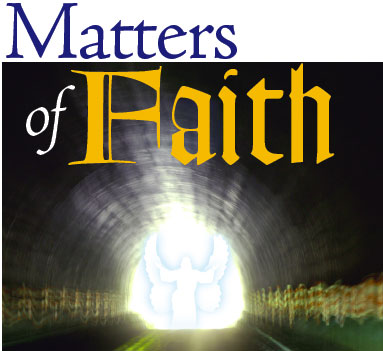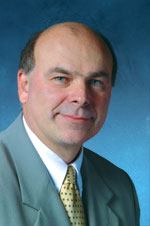Matters of Faith
Lincoln E. Steed July/August 2007
Getting your Trinity Audio player ready...

What is faith? What is religion? These questions are not as easily answered as you think. Faith—Jesus told His disciples that there would not be much of it around when He returns at the end of days. Religion—sometimes there seems too much of it. Especially in government as it relates to the safety issue of keeping religious and secular power separate in their own spheres of authority.
Often in these pages I have referred to a "shared cosmology," as a way to pin down the religious values of a society. I've taken that approach because of our charter to defend the rights of all to believe what they will—religious freedom. Of course cosmology is a pretty big tent—as big as all outdoors. By it I mean a shared understanding of where we stand in relation to the infinite. And I have pretty firm ideas about that myself. I tend to agree with the apostle Paul when he wrote that those who deny the existence of God "deliberately ignore the fact that all of it was made by the word of God from nothing."
I like my cosmology euphemism, obviously. So it surprised me a little the other day to listen to the struggle a Professor Johnson of Emory University had in putting out even a basic definition of what religion is. It was part of a series of taped lectures on "The Experience of the Divine," and the professor needed to set basic definitions. It bothered me that most of the definitions of religion differ even on the most basic points. I found little commonality between the various definitions set forth over the years.
For example, in the nineteenth century Friedrich Schleiermacher said that religion is "a feeling of absolute dependency." Problematic to me: mother and child imagery and not much more.
In his book, Idea of the Holy, twentieth century philosopher Rudolf Otto set out religion as "that which grows out of and gives expression to the experience of the holy in its various aspects." Again problematic: we cannot all agree on what is holy.
And talk about polar opposite takes on religion—philosopher Alfred North Whitehead put religion as what someone does with his solitariness, while Emile Durkheim, the founder of sociology, defined religion as "social."
Professor Johnson offered more: Kant—"the recognition of all our duties as divine commands" ; Dewey—"any activity pursued on behalf of an ideal against obstacles and in spite of threats of personal loss because of its general and enduring value" (I could see politics as fitting under that definition); Paul Tillich—"an ultimate concern, which contains the answer to the meaning of our lives" (but some religions actually mandate meaninglessness).
I'll break the long sentence for a short paragraph of secular observations: Freud—"childhood neurosis and wish fulfillment"; Marx—"sign of the oppressed creature—the opium of the people." I have a feeling that both these men would be super keen on separation of church and state, and super ready to abolish any free exercise of religion as unhealthy.
Which is a good place to insert the point behind much of my inquiry. There is a growing clamor from some of the politically active faithful in our society to consider secular humanism a religion. It is a curious call, not at all based on the affinity that people of deep spirituality might feel for others of a different take on the divine. Of course we are living in a curious time. The U.S. Constitution mandated that there be no religious test for public office—but there is currently spirited public debate on the appropriateness of a Mormon running for president. Not to mention the not so cute double-talk of a well-known evangelical leader who on television firmly upheld religious freedom and the separation of church and state, saying that it made no difference whether we elected "a Christian or a Mormon"! I have my views of theology and truth, but categorizations of faith like this fed the craziness of Nazi Germany.
Is secular humanism a religion? Nobody accused the Nazis of being a religious movement—and they were the ultimate expression of secularist self-determinism. Communism did ape some of the models of religious behavior, but it was too antagonistic to religion to even allow itself to be considered of that family.
The confusion behind the readiness to re-categorize secular humanism is, I believe, a confusion about faith itself.
Faith in the context of religion is not optimism. It is not even dedication per se. It is not a free radical. Faith makes sense only when connected to the transcendent—to the Divine. The Bible itself says that he who comes to God must first believe that "He is." And that is not to be equated with the philosopher's "I think, therefore I am." The secular humanist is merely insane if he dreams like Dostoevsky's suicidal character of becoming God Himself by the ultimate act of self-determination—killing the idea of God doesn't create divinity and transcendence.
I have warned before about Western society's drift toward moral values without spirituality. It was, of course, an error of moral self-righteousness that created the horror of World War II. Moral values without spiritual renewal in America differ not much structurally from secular humanism. That way both religion and secularism are removed from the transcendent. It puts me to mind of the end to John Bunyan's Pilgrim's Progress that no one seems to remember: after Pilgrim has successfully crossed over the river into the City, Ignorance and the ferryman, Vain-hope, also cross. They are not recognized by the Deity. After all, they were not particularly concerned with the transcendent.
Enough of the foolishness of trying to redefine the poor limits of secular humanism as religion. The goal may be to do away with inhibitions restricting the secular prerogatives of religion. That goal has much more to do with a diminished respect for the Constitution than it should ever have to do with calling secular humanism a religion. The framers of the Constitution would, I think, have been mighty uncomfortable with that redefinition. They knew the personal landscape of faith and mandated that both secularist religionist were to be protected and respected. They left faith to the individual conscience.


Lincoln E. Steed
Editor,
Liberty Magazine
Article Author: Lincoln E. Steed
Lincoln E. Steed is the editor of Liberty magazine, a 200,000 circulation religious liberty journal which is distributed to political leaders, judiciary, lawyers and other thought leaders in North America. He is additionally the host of the weekly 3ABN television show "The Liberty Insider," and the radio program "Lifequest Liberty."